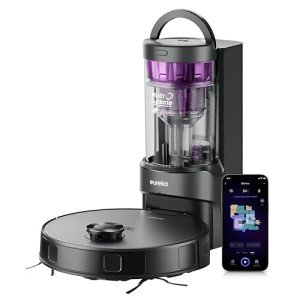Self Cleaning Vacuum 10 Things I'd Like To Have Known Earlier
The Rise of Self-Cleaning Vacuums: Revolutionizing Household Maintenance
In a period where convenience and performance reign supreme, family appliances have progressed to meet the demands of busy lifestyles. Among smart vacuum cleaner in the world of home cleaning is the self-cleaning vacuum. These sophisticated devices are created not just to tidy floorings but also to preserve themselves with very little human intervention. This article explores the operations, advantages, possible downsides, and future of self-cleaning vacuums.
Understanding Self-Cleaning Vacuums
Self-cleaning vacuums represent a considerable leap from traditional vacuum cleaners. They are equipped with smart technologies that enable them to perform maintenance tasks instantly. This includes tasks such as clearing the dustbin, cleaning the brush rolls, and even charging themselves. These functions are created to decrease the time users invest in maintenance, enabling a more smooth cleaning experience.
Secret Features of Self-Cleaning Vacuums
Function
Description
Self-Emptying Dustbin
Automatically gets rid of collected dirt and particles into a bigger bin.
Brush Roll Cleaning
Uses brushes that get rid of twisted hair and debris to enhance efficiency.
Smart Navigation
Utilizes sensing units and cameras for effective cleaning paths and obstacle avoidance.
App Integration
Allows users to control the vacuum from another location and receive upkeep alerts.
Self-Charging
Returns to a docking station to charge when the battery is low.
The Advantages of Self-Cleaning Vacuums
The benefits of incorporating a self-cleaning vacuum into a home cleaning regimen are various:
Convenience: Self-cleaning vacuums significantly minimize the manual work associated with traditional vacuuming. Users no longer require to stop to empty dustbins after every cleaning session.
Time-Saving: By automating cleaning and maintenance jobs, users can assign their time to other crucial activities.
Consistency in Cleaning: With advanced navigation technologies, self-cleaning vacuums can preserve a routine cleaning schedule, making sure floorings are regularly tidy.
Enhanced Indoor Air Quality: Many self-cleaning vacuums included sophisticated filtration systems that trap irritants and contaminants, adding to much better indoor air quality.
Low Maintenance: These vacuums require less regular attention concerning upkeep, as many of their maintenance tasks occur instantly.
Preparing the Pros and Cons
Pros
Cons
Convenience and ease of usage
Higher initial cost
Constant cleaning results
May need software updates
Advanced purification options
Dependence on innovation
Less manual maintenance
Restricted to home cleaning jobs
Prospective Drawbacks of Self-Cleaning Vacuums
Despite their benefits, self-cleaning vacuums are not without their difficulties:
Cost: The preliminary investment for a self-cleaning vacuum can be substantially higher than conventional designs.
Dependability: Like any smart technology, these vacuums depend on software updates and battery effectiveness. Users might experience problems if the vacuum breakdowns.
Restricted Cleaning Capacity: While self-cleaning vacuums stand out on hard floorings and low-pile carpets, they might have a hard time on thicker carpets or rugs.
Complex Repairs: Issues developing from innovative innovation may lead to complicated repairs or perhaps demand professional assistance.
Selecting the Right Self-Cleaning Vacuum
When thinking about a self-cleaning vacuum, it is vital to examine numerous features and performances to figure out the very best suitable for your home needs. Here are some aspects to consider:
Floor Types: Identify the types of floorings in your house. Some vacuums carry out better on carpets, while others are designed for hard floorings.
Dustbin Capacity: Check the capacity of the self-emptying dustbin to ensure it fulfills your cleaning frequency and volume.
Battery Life: Consider the length of time the vacuum can run before needing to charge.
Smart Features: Look for vacuums with app integration that permits for push-button control and customization.
Maintenance Requirements: Assess how typically you will need to change filters, tidy the brushes by hand, and carry out other upkeep jobs.
Regularly Asked Questions (FAQs)
1. How does a self-cleaning vacuum work?Self-cleaning vacuums are equipped with sensing units and smart technology that permit them to browse and clean floorings efficiently. They auto-empty dirt and particles into a docking station and often self-clean brush rolls.
2. Are self-cleaning vacuums worth it?While they include a higher cost, numerous users find the convenience and time cost savings justify the expense, especially in hectic families.
3. Can self-cleaning vacuums be managed by means of smartphone?Yes, numerous self-cleaning vacuums come with app combination, enabling users to control cleaning schedules, screen battery life, and receive maintenance alerts from another location.
4. How typically do I need to empty the base station?This depends upon how often the vacuum is used and the size of the dustbin. Generally, users might require to empty it every few weeks.
5. Do self-cleaning vacuums work on carpets?Lots of self-cleaning vacuums carry out well on low to mid-pile carpets but may have problem with high-pile carpets or thick rugs.
The Future of Self-Cleaning Vacuums
As innovation continues to advance, the future of self-cleaning vacuums looks appealing. Innovations may cause much more efficient cleaning systems efficient in handling varied floor types, integrating AI for smarter cleaning choices, and boosting overall user experience with better connectivity.
Top makers are vying to capture a significant share of this market by continuously improving the design and functions of their self-cleaning vacuums. The focus is likely to remain on boosting functionality, cost, and energy efficiency, making these devices an integral part of modern household management.
In conclusion, self-cleaning vacuums represent an exceptional improvement in home cleaning technology. Despite their couple of downsides, the advantages they provide— benefit, time savings, and improved cleaning efficiency— make them an attractive alternative for many families wanting to enhance their cleaning routines and enhance their home.
